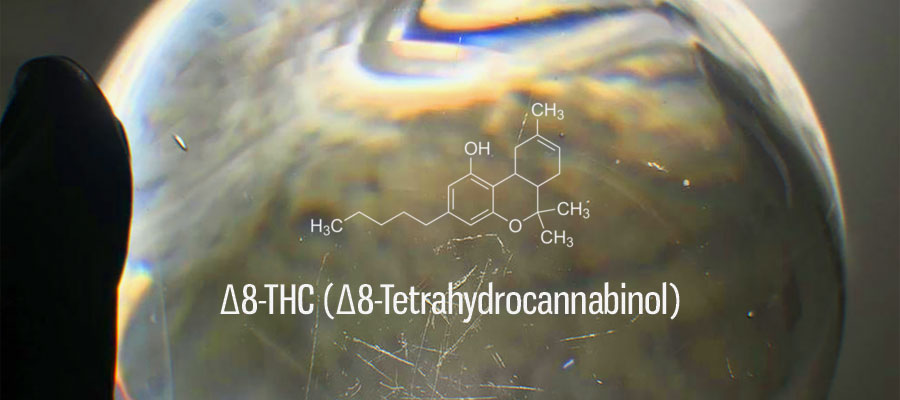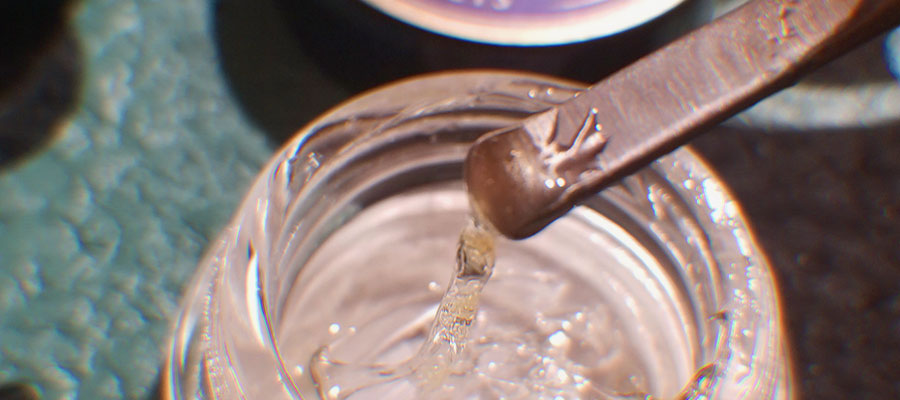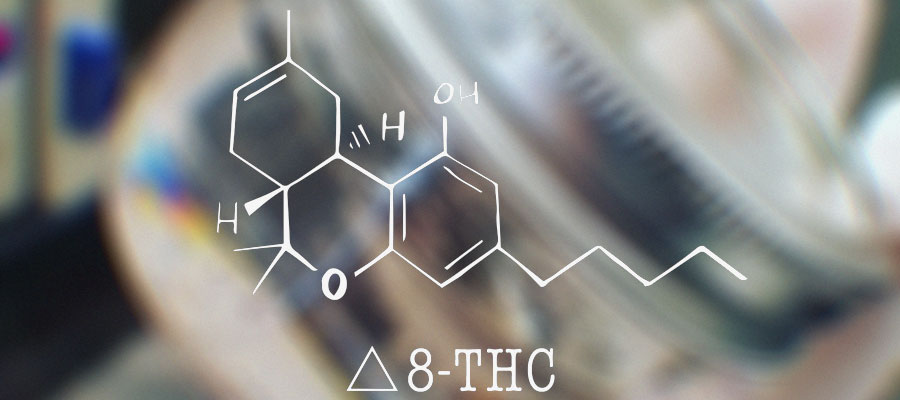Delta 8-THC: Benefits, How It Works & Scientific Evidenc
2018-01-02
Delta 8-THC is surging in popularity.
Delta 8-THC is not as well-known as Delta 9-THC, the main type of THC in cannabis. It’s also not as well-known as other cannabinoids like CBD and THC – but Delta 8-THC could provide its own powerful benefits.
As research on Delta 8-THC continues, we’re learning more about the cannabinoid and how it works.
What is Delta 8-THC? How does Delta 8-THC work? What’s the difference between it and Delta-9 THC or other cannabinoids? Find out everything you need to know about Delta 8-THC today in our review.
What is Delta 8-THC?
Delta 8-THC is a cannabinoid. Cannabinoids are natural chemicals found within the cannabis plant. Other well-known cannabinoids include tetrahydrocannabinol (THC) and cannabidiol (CBD).
THC and CBD gets lots of attention. They’re the two most-studied cannabinoids in the cannabis plant. However, there are hundreds of other cannabinoids in the plant, and research is increasingly linking those cannabinoids to various benefits.
Most tetrahydrocannabinol (THC) in the cannabis plant is Delta 9-THC. In fact, some use Delta 9-THC and THC interchangeably: most THC is Delta 9-THC, so they don’t bother to differentiate it. When cannabis products list their dosage of THC, they’re listing their dosage of Delta 9-THC.
THC – including Delta 9-THC – is the main psychoactive ingredient in the cannabis plant. It’s the compound that causes you to feel high.
Delta 8-THC also gets you high – but to a lesser extent than Delta 9-THC. Research shows Delta 8-THC could provide similar therapeutic benefits to Delta 9-THC – but without unwanted side effects.
The lack of psychoactive properties is important. In studies, researchers gave Delta 8-THC to children with cancer, for example, to reduce the risk of vomiting. In other studies, mice treated with Delta 8-THC increased appetite – all without unwanted side effects linked to ordinary THC.
Some claim Delta 8-THC gives them a more clear-headed high, allowing them to enjoy the benefits of CBD and the overall cannabis plant while still feeling productive and energized.

Why is Delta 8-THC a Big Deal?
Here’s the most important thing to know about Delta 8-THC: it appears toprovide similar benefits to its well-knownpartner, Delta 9-THC, but with less intense side effects.
In other words, Delta-8 THC could help you enjoy the benefits of ordinary THC (like the feeling of being high) without the unwanted side effects (likeparanoia and anxiety) caused by getting too high.
Like Delta 9-THC, Delta-8 THC binds to CB1 receptors. Unlike Delta 9-THC, however, Delta 8-THC is more stable and lesspotent. It has a lower affinity for CB1 receptors, which could be the reason for the lessened effect.
Why haven’t you heard of Delta 8-THC before?
Well, there’s relatively little Delta 8-THC in the cannabisplant. It’s not as common as Delta 9-THC, and it cannot be naturally found in large quantities in theplant. You must extract it from theplant or synthesize it.
Benefits of Delta 8-THC
As more studies get released, we’re learning more about Delta 8-THC and how it works.
In this reportpublished through MedGen, researchers described Delta 8-THC as “an analogue of tetrahydrocannabinol (THC) with antiemetic, anxiolytic, appetite-stimulating, analgesic, and neuroprotectiveproperties.”
In non-medical terms, researchers linked Delta 8-THC to anti-nausea (antiemetic), anti-anxiety (anxiolytic), andpain relief (analgesic) benefits, among other effects. Delta 8-THC could stimulate your appetite. It could alsoprotect brain cells thanks to its neuroprotective effects.
Researchers also found that Delta 8-THC “exhibits a lowerpsychotropicpotency” than Delta 9-THC. It still gets you high, but you don’t get as high as you normally would taking the same amount of THC.
Early Delta 8-THCproducts on the market today arepraised for their ability to deliver CBD-like benefits and a different type of “high” than ordinary THC.
Many users claim Delta 8-THC gives them a more clear-headed high, for example. Because Delta 8-THC is a form of THC, it still gets you high – but manypeople claim they don’t feel out of control. Some claim to feel energized and motivated after taking Delta 8-THC – not lethargic.
The most notable benefits linked to Delta 8-THC include:
Stimulate appetite
Help withpain and inflammation
Eliminate nausea in cancerpatients
Enjoy a clearer-headed high compared to ordinary THC
Enjoy CBD-like benefits in terms of anxiety,pain, and inflammation
Could work topically (applied to the skin) or orally

Scientific Evidence for Delta 8-THC
Delta 8-THC has only recently become legal in small quantities, which is why there’s been limited Delta 8-THC research up to this point.
This 1995 study described Delta 8-THC as “an efficient new cannabinoid” with “lower psychotropic potency than the main cannabis constituent, delta-9-THC.” In that study, researchers gave Delta 8-THC to children aged 3 to 13 years with hematologic cancers and found that Delta 8-THC reduced nausea related to cancer treatment. Researchers observed no significant side effects.
In 2004, researchers analyzed Delta 8-THC and its effect on appetite control. Researchers gave Delta 8-THC to mice who had recently completed a weight loss regimen. Researchers found that Delta 8-THC caused increased food consumption and improved cognitive function without the effects typically linked to cannabis.
Based on these results, researchers suggested that a low dose of Delta 8-THC “might be a potential therapeutic agent in the treatment of weight disorders.”
More recent studies have linked Delta 8-THC to other effects.
This 2018 study published in Cannabis and Cannabinoid Research found that Delta 8-THC could reduce pain and inflammation in mice. Researchers applied Delta 8-THC topically to mice and observed reduced pain and inflammation on the area. Researchers linked these benefits to Delta 8-THC’s effects on CB1 receptors.
Researchers observed similar pain-relief effects in another trial on rats. Researchers found that Delta 8-THC was linked to pain relief in rats, although they also found that rats quickly developed a tolerance to the cannabinoid.
Although these studies are promising, they’re also limited. There are few other major studies on Delta 8-THC. The studies above were performed on small groups of people or animal models.
With media attention on Delta 8-THC growing, however, expect to see more studies on the compound moving forward.
Delta 8-THC and the Entourage or Ensemble Effect
Some believe Delta 8-THC could encourage an entourage or ensemble effect.
The entourage or ensemble effect is the idea that cannabis works best when taking the full spectrum of cannabinoids at once. Instead of isolating a specific cannabinoid – like THC or CBD – you can enjoy more powerful effects by taking all cannabinoids at once.
Theoretically, Delta THC-8 should help with the entourage effect because it’s another cannabinoid. However, there’s no research proving that cannabis is more or less effective with Delta THC-8.
Is Delta 8-THC Legal?
There’s some confusion about the legality of Delta 8-THC.
Because Delta 8-THC is a version of THC, it’s not legal nationwide. Like THC, Delta 8-THC gets you high – even if it’s a lesser effect.
The 2018 Farm Bill clarified the legal status of non-psychoactive cannabis plants. That bill stated that hemp products were legal if they contained less than 0.3% THC. However, the bill specifically stated 0.3% of Delta 9-THC. It did not specify the amount of Delta 8-THC because it’s considered a minor cannabinoid.
Because of the lack of clarification, people assumed Delta 8-THC was legal in any concentration. Because Delta 8-THC was not specifically mentioned, people could start growing Delta 8-THC strains or synthetic versions of Delta 8-THC.
However, the DEA recently published an addendum to the 2018 Farm Bill clarifying the legal status of Delta 8-THC. The addendum redefines tetrahydrocannabinols under the law, stating that it’s illegal to synthetically produce THC in any form – regardless of whether it’s Delta 8-THC or Delta 9-THC:
“For synthetically derived tetrahydrocannabinols, the concentration of Δ 9-THC is not a determining factor in whether the material is a controlled substance. All synthetically derived tetrahydrocannabinols remain schedule I controlled substances.”
In other words, the DEA closed the loophole. The legal status of Delta 9-THC isn’t totally clear today. Some argue it should be treated like any version of THC, while others argue that Delta 9-THC is legal if extracted from hemp plants with less than 0.3% THC overall.
Get Ready for Delta 8-THC Extracts and Synthetics
One reason why Delta 8-THC is lesser known is because cannabis plants have naturally low concentrations of the cannabinoid.
Most cannabis plants are rich with Delta 9-THC, the well-known substance with psychoactive effects. Hemp, by law, contains less than 0.3% Delta 9-THC.
To access the benefits of Delta 8-THC, we need to extract it or synthesize it.
This is where manufacturers get confused: is Delta 8-THC legal if synthesized in lower concentrations than 0.3%? Can we synthesize or extract Delta 8-THC from hemp plants (which are legal nationwide) and turn them into high-concentration Delta 8-THC therapies?
These are questions the cannabis industry needs to answer about Delta 8-THC moving forward.

Savage Enterprises Delta Effex
Despite murky regulations, one company is going ahead with its Delta 8-THC product. CBD and kratom company Savage Enterprises is entering the cannabis-derived products space with a product called Delta Effex.
Delta Effex contains Delta 8-THC – not the Delta 9-THC contained in most other cannabis and THC products. As mentioned above, Delta 8-THC could provide many of the therapeutic benefits of THC without the downsides.
In an interview with Merry Jane, Alfredo Gomez of Savage Enterprises described the benefits of Delta 8-THC and the potential for their product moving forward.
Gomez praised Delta 8-THC for being an isomer of CBD and a derivative of hemp and CBD, which makes Delta Effex legal nationwide: the product contains less than 0.3% Delta 9-THC, while the Delta 8-THC is like a “middle ground” between hemp, CBD, and Delta 9-THC.
Gomez claimed the Delta 8-THC in Delta Effex will still get you high, because Delta 8-THC is still a psychoactive compound. However, he claims many people enjoy “a more clear-headed high” compared to Delta 9-THC.
Some claim to get a surge in motivation and energy when taking Delta Effex in low dosages, according to Gomez. Many still get a euphoric sensation.
Delta Effex comes in the form of a cartridge. You add the cartridge to your battery device, then vape. The company also plans to launch a Delta 8-THC Pod and a Pod Device in the near future.
Who Should Use Delta 8-THC?
Delta 8-THC could fill the needs of a unique segment of the market.
According to Gomez, Delta Effex customers are people who use CBD but don’t like Delta 9-THC because it gets them too high. They want a middle ground that provides the benefits of CBD and a mild feeling of highness – without feeling like they have impaired their cognitive functions.
Delta THC-8 Safety & Side Effects
Because research on Delta THC-8 is limited, it’s hard to verify the safety and efficacy of the compound. Theoretically, the compound should have similar side effects to ordinary THC. However, we still don’t know much about Delta THC-8 and how it works – so it’s not clear how side effects could work.
This 1976 study linked Delta THC-8 and Delta THC-9 to increased blood pressure in rats. Researchers found that both forms of THC constricted blood vessels temporarily, which raised blood pressure. This rise in blood pressure was followed by a drop in blood pressure and a slower heart rate.
In this 2018 review, researchers analyzed over a dozen studies on Delta 8-THC to analyze its safety. Researchers found that Delta 8-THC raised heart rate and blood pressure in animals, although these effects were not observed in humans. Delta 8-THC raised heart rate in humans – but it did not raise blood pressure. Based on this analysis, researchers concluded that Delta 8-THC “acts differently according to species and experimental conditions.” They also found that “data is limited”, recommending further studies to verify the safety of the compound.
Meanwhile, the pain relief study on rats linked above found that rats quickly developed a tolerance to Delta 8-THC. Rats enjoyed significant pain relief, although they grew tolerant to it over time.
Overall, early research suggests that Delta 8-THC has similar side effects and safety to Delta 9-THC (the most common type of THC), although more research is needed (particularly on humans).
Final Word
Delta 8-THC products have officially hit the market.
Some take Delta 8-THC to enjoy the benefits of CBD with a better “high”. Some report experiencing a more clear-headed high, for example, than they would with ordinary THC products.
Early research suggests Delta 8-THC could have powerful benefits with pain, anxiety, and nausea. However, there’s limited research to date about the safety or efficacy of Delta 8-THC.
Stay tuned for more information about Delta 8-THC as research on the cannabinoid continues to grow.